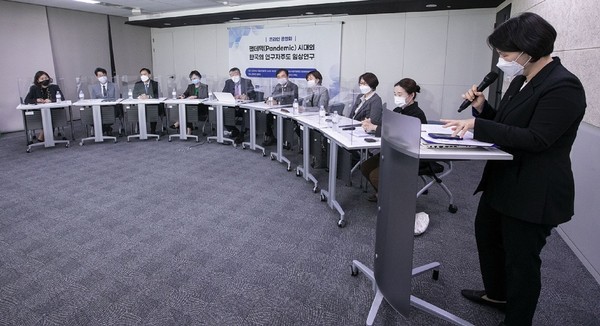Researchers need the government’s support to carry out more investigator-initiated trials (IIT) because pharmaceutical firms barely sponsor them, oncology experts said.
Leading cancer treatment experts discussed various issues at a public hearing on “Investigator-Initiated Trials in Korea in the Era of the Pandemic,” jointly organized by the Korean Cancer Study Group (KCSG) and the Korea National Enterprise for Clinical Trials (KONECT) on Thursday.
150 IIT-related business officials, scholars, and researchers participated in the online event amid the Covid-19 pandemic and discussed various IIT-related agendas.
The first session's topic included the necessity and importance of IIT and the problems and improvement measures of local IIT.
Professor Keam Bhum-suk of the Hepato-Oncology Department of the Seoul National University Hospital said IIT is needed in fields that barely draw pharmaceutical companies' attention, such as rare and intractable cancer. Also, IIT helps to re-evaluate medicines from a scientific and neutral perspective, he explained.
Kim Jeong-mi, director of the Clinical Trials Policy Division at the Ministry of Food and Drug Safety, said the nation needs diverse systems to enhance IIT’s completeness of data and secure reliability. “We need a state funding to build a system to collect and analyze electronic data or another where all researchers can share oncology data as open sources,” she said.
In the second session, speakers presented the need for government funding, local IIT in the pandemic era, and the public clinical trial initiative of KONECT.
Professor Kim Yeul-hong of the Oncology-Hematology Department of Korea University Anam Hospital said sponsor-initiated clinical trials (SIT) are usually led by drugmakers who invest a large amount of research money releasing a new drug and win marketing license.
In contrast, IITs rarely get private funding because they are not directly related to pharmaceutical firms’ profit-making, he said.
However, as IITs deal with topics essential for the public interest, they desperately need state support, Kim emphasized.
More specifically, state support is needed for securing investigational drugs and establishing a diagnostic platform, providing insurance benefits for standard care for patients participating in clinical studies, covering costs for data management and trial operation, and expanding clinical outcome-based approval and insurance benefits, Kim said.
Park Yeon-hee, a professor at the Hematology-Oncology Department of Samsung Medical Center, said the number of clinical trials at Korea’s three leading hospitals this year was similar to that of last year, despite the Covid-19 situation.

“The proportion of IIT increased to 13 percent this year from 11 percent last year, and there was no significant difference in new patient registration,” she said. “Thanks to Korea’s national health insurance system, advanced diagnostic techniques, and well-trained medical professionals, researchers could proceed clinical trials normally even during the spread of the infectious disease.”
KONECT’s Clinical Trial Support Center for Public Interest said IITs contribute to the clinical trial industry's vitalization because they reduce medical expenses and costs for new drug development. The support center said it would strengthen research activities for new drug development.
The center also said that it would increase the number of studies supported by the center from six to more than 10 in 2021 and support trials by emerging researchers.
KCSG President Kang Jin-hyoung (Oncology Department at St. Mary’s Hospital) said, “IITs in Korea have become active since the establishment of the KCSG, and local researchers have published many clinical outcomes that attracted the world’s attention.”
He hoped that IIT supporting measures discussed at the hearing would help make policies and expand local IITs.

